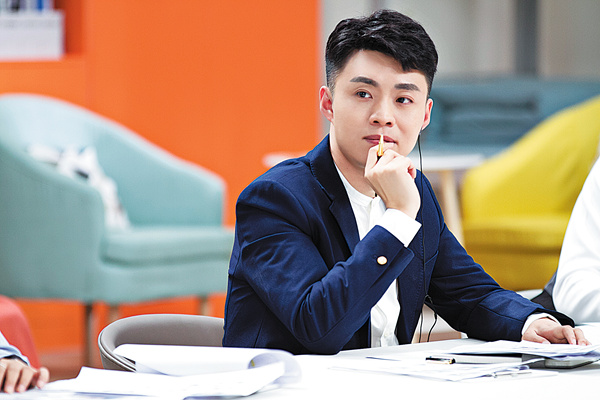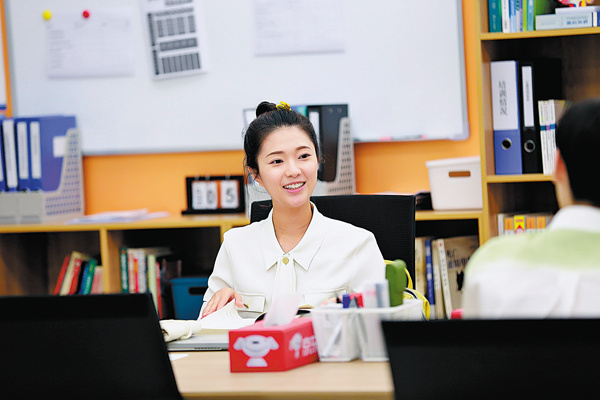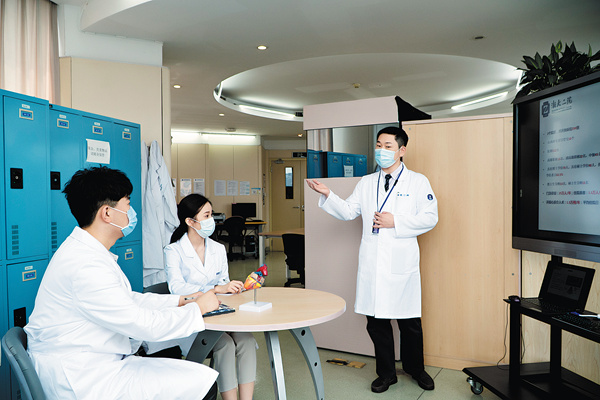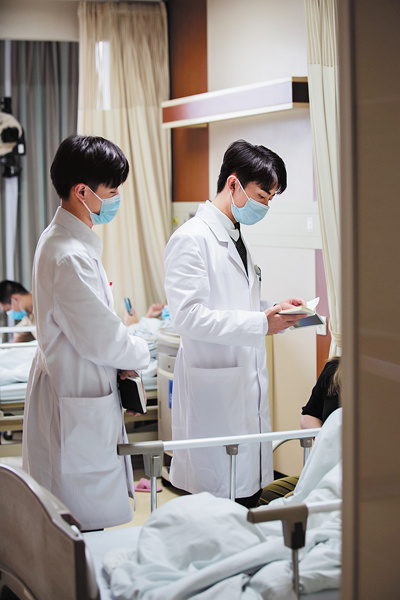
Reality show's latest installment sheds light on the trials and tribulations of medical students transitioning from classroom to clinic, Wang Kaihao reports.
As medical students, they may have the envied privilege of remaining in their ivory tower longer than other majors. Nevertheless, sooner or later, they still have to face pressure of looking for a job amid intense competition.
The third season of The Exciting Offer, a reality show on streaming platform Tencent, was released on Nov 9 to follow the stories of these future doctors.
In the show, eight medical students from around the country become interns at the Second Affiliated Hospital, Zhejiang University School of Medicine, in Hangzhou.
They are tutored by the respective doctors from the departments of cardiology, neurosurgery, and hepato-pancreato-biliary surgery in checking sickbeds, writing medical reports and finishing other daily tasks. They also take part in simulated diagnoses of patients and provide medical suggestions.
By the end of the season, the most outstanding student will be offered an interview by the hospital director.
Whether they are PhD candidates who have already been job-hunting or first-year graduate students who are still dreaming of future possibilities, their clinical inexperience is captured by the cameras.

All doctors have to start somewhere, though.
"When joining this show and getting exposure in media, they will probably face the risk of being doubted," Wang Xinxuan, producer of the program, says. "But they want to show the process and enable people to see how a medical student becomes a doctor.
"They might be elites in their respective classrooms, but here in the clinical departments, they are beginners," she says. "Their effort enables people to better understand the job of doctors. It's a precious opportunity for the audience."
First released in 2019 to much acclaim, the previous two seasons of The Exciting Offer focused on young job seekers vying for a job at a prestigious law firm. When preparing for the new season, Wang wanted to switch it up and cover a different sector, one that would be "mysterious, yet widely expected by young people". Medical students seemed the obvious choice to her.
"Medical issues are closely linked to daily life," she recalls. "The pandemic has encouraged many young people to switch their attention to health and hospitals, but they lack knowledge about how a hospital is operated daily. Everyone gets to see doctors, but do we really understand them?"
However, the decision has caused some minor controversy, with some criticism being leveled at the crew from some members of the public for seemingly trivializing the serious business of medical care by making it the theme of a reality show for people's entertainment.
"A reality show is merely a platform," Wang explains. "Most people's impression of medical students is based on artistic expression of films or TV series and, this time, we'd like to show the reality of that."

The producer also expects the new season to encourage people to learn about the working conditions of medical practitioners from the beginners' point of view.
"Knowing their commitment to their career, people will be more supportive and more tolerant," Wang says.
Lack of understanding can sometimes lead to misfortune. Tao Yong, a leading oculist from Beijing Chaoyang Hospital, was the victim in a horrific attack at the hands of a patient, but he managed to remain optimistic.
The oculist, who was once in the eye of a national news storm, is now a guest commentator on the new reality show.
"In ancient times, people referred to witchcraft as medicine," Tao says. "But in modern times, people tend to see medicine as having a magical ability to cure all diseases."
Therefore, he says, programs like The Exciting Offer provide a fairer and more scientific public view of doctors.
"Medicine is a process in which we keep practicing and growing," Tao further explains. "Being a doctor is to hone your skills and to excel at what you're good at.
"Young medical students have much better living conditions than our (school) days," he says. "Now, they're more eager to realize their own values when choosing medicine as their career."
Talking about why they chose medicine as their major, the students in The Exciting Offer express different reasons. One student is aiming to be his family's fourth-generation medical practitioner and sees the career as a duty to continue a family tradition. Another student says the toughness of learning medicine once made him want to quit, but all of the past effort he has put in over the years spurs him on.
"Their diversity just reflects the various facets of today's young people, and medical students in particular," Wang says.

There is no script and more than 80 percent of the footage is captured by surveillance cameras as a way to avoid too much interference in operation of the hospital. The crew had to get consent from every patient appearing in the program.
While situations the students face in the program can easily resonate with audience members of their age, such as getting nervous before presentations or being criticized by tutors when failing to answer questions correctly or follow the right work procedure, warm and even amusing moments keep popping up.
For example, one student draws a cartoon and gives it as a gift to encourage a patient before operation. When a senior female patient says she has a headache, another student gives her a thorough body test, lasting more than an hour, to check if there is anything wrong with her neural system.
"Many people may laugh when watching this, but it was what we did," Tao says. "It is clinical experience that tells us which part of the check should be emphasized more, and which part can be done more quickly.
"What the patients need is beyond treatment," he says. "They also need humanity and care. Many details in this program just reflect a warm atmosphere. We expect the relationship between patients and doctors to be like that of friends."
"Medicine is a science," Ding Rongjing, a cardiologist from Peking University People's Hospital, shares her experience of watching the program. "It needs solid theoretical foundation. But you cannot just move what you've learned in textbooks into clinics.
"The program reminds me of my days when I almost knew nothing about clinics," she says. "The days were exciting, and full of hope, but I also lived with anxiety … It's a pleasure to see a new generation of students grow and get experience."





